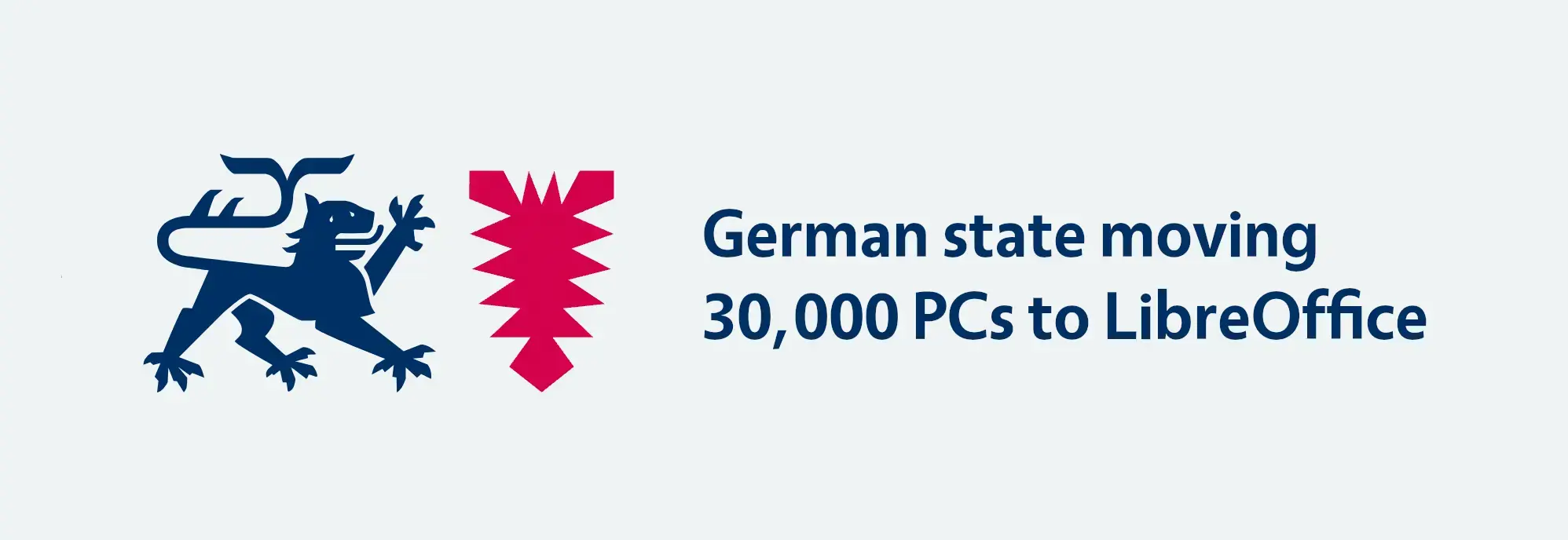Schleswig-Holstein, the northern German federal state, will be a digital pioneer region and the first German state to introduce a digitally sovereign IT workplace in its state administration. With a cabinet decision to introduce the open-source software LibreOffice as the standard office solution across the board, the government has given the go-ahead for the first step towards complete digital sovereignty in the state, with further steps to follow.
The some 30,000 public employees will replace Microsoft Office with LibreOffice, Windows with a yet-to-be-determined Linux desktop distro, and use Nextcloud, Open Xchange/Thunderbird, and the Univention Active Directory (AD) connector to replace Sharepoint and Exchange/Outlook. The state also intends to replace Telekom-Flexport by an Open Source solution.
“The use of open source software also benefits from improved IT security, cost-effectiveness, data protection, and seamless collaboration between different systems,” says Dirk Schrödter, digitalization minister for the German state of Schleswig-Holstein.
“We have no influence on the operating processes of [proprietary] solutions and the handling of data, including a possible outflow of data to third countries,” he adds.
“We have a great responsibility towards our citizens and companies to ensure that their data is kept safe with us, and we must ensure that we are always in control of the IT solutions we use and that we can act independently as a state.”
As The Document Foundation, the organization backing LibreOffice, put it, “The term digital sovereignty is very important here. If a public administration uses proprietary, closed software that can’t be studied or modified, it is very difficult to know what happens to users’ data.”
Last time they tried this (that was Munich IIRC) it was just too early. All they really had access to was OpenOffice, which - and I appreciate all the work that went into it by all the selfless contributors! - was kind of shit. Now there are a least three office suites with decent MS compatibility, which is critical for being a functioning part of a larger organization, not to mention Office365 web if worst comes to worst. At least they wouldn’t have to roll back everything if they encounter problems, like Munich did.
This is great news.
I think it’s important to remember that LiMux, the Linux project in Munich, didn’t really fail because the software didn’t work. The city had commissioned a study that blamed bad implementation, bad internal cooperation, and bad administration. It explicitly did not recommend that the project be shut down. Unfortunately, this recommendation was ignored by the mayor, who was previously responsible for convincing Microsoft to move its German headquarters to Munich and who calls himself a “Microsoft fan”.
So it’s probably worth noting that the success of such large projects doesn’t only depend on the viability of the software. It’s also very much dependent on the lobbyists the project is up against, especially in the public sector.
I recalled that too. It was like 15 years ago think. The whole thing was a disaster. Adoption was as much an issue as compatibility. Linux and LibreOffice has come along a long way since then. But so did MS. Not even google manages to compete with the level of integration and interoperability MS has. Also, being a state organized enterprise, you just know the transition phase is gonna be chaos incarnate. I just hope the top management is ready for the fight. I truly believe it’s worth it.
I don’t know if it is fair to call it a disaster. I don’t know enough from the inside, but I believe in retrospect the goal was maybe to ambitious or plain wrong.
They were attempting to port huge amounts of decades old Office macros to OpenOffice. That failed, but before the LiMux project they had already failed to migrate the same to a modern version of MS Office.
The goal for LiMux was to be a better Windows than the best Windows Microsoft would offer at the time. Literally impossible.
That combined with strong lobbying and users confused with a different UI and probably a lot of small day-to-day issues (which happens with any software, but can make an IT department look bad) made it politically hard to sustain an ‘experiment’.
The current IT lead of Munich, hired after migrating back to Microsoft, does not seem to be a Microsoft fan.
How can Germany be so cool and scary at the same time?
What’s scary about it?
Don’t get me started on how uncool this country actually is. You only ever hear the good news.
Then the brutal reality hits: Your app vendor, “We don’t support that.”
What’s an app vendor here? Or what does that mean in general? I feel like one of the reasons given on other (failed) attempts to switch to libre software has been that other public places / ministries etc still using MS had incompatibilities with e. g. Munich’s FOSS stack. Though I think this is something you could overcome if you wanted to, it’s not like these problems don’t exist (and probably have solutions) elsewhere. I think FOSS software has come pretty far in the last years, I haven’t booted my Windows partition in months, so I have a tiny bit of hope that they can make it work.
Libre office and Linux desktops are not line of business apps. They are platforms to run/supplement line of business apps. There are very few line of business apps that run HR, the finance department, EMR if you’re in a hospital system, etc, etc, etc as open source or run on open source solutions. For decades Open Source advocates kept thinking it was the ability to run Office that shut down “The year of Linux desktops!!!” But that isn’t it at all. It’s those specialized apps that run the businesses that prevented it. I work in a hospital system, our line of business app is Epic or Cerner. Apps that digitize the health records. The requirements to run these apps is Windows Server, because that is what the front ends are built on. And these apps, especially the front ends, are heavy and complex. Any attempt to turn them into web apps has failed miserably because the performance just isn’t there vs running say, the Epic/Cerner front end in a Citrix solution. Client-Server isn’t dead, it just doesn’t get sexy press anymore. Obviously if you work in web development, it is a very different story. But even in those shops, I’ll bet the business support apps (HR, finance, etc) run heavily on Windows.
Lord knows I’ve tried to advocate for open source solutions where I can, but if the apps the business picks to suit their needs only runs in Windows? You’re infrastructure has already been chosen for you. And THAT is what the average wannabe IT person on the internet doesn’t understand in the slightest.
Most specialized software are web apps running in a browser hosted on the cloud these days. I’m sure they exist, but I couldn’t name any HR, ERM, CRM, … software that’s not a web app.
The desktop OS is becoming irrelevant. That’s why those who want a Mac or Linux notebook can make it work, at least from a purely technical point of view; i.e. if the company allows it. That’s also, why there will never be a year of the Linux desktop. (I mention Macs here, because while OS X gets some commercial software that you won’t get on Linux, it’s not that much outside of some niches)
There will never be a year of the Linux desktop because you gain very little from replacing Edge on Windows with Firefox on Linux (a different software that does the same thing). However, you loose some specialised software and your IT supplier, your IT service provider, half of your IT staff and some of your non-IT employees’ skills. This does not sound like a good business case.
Linux on the desktop never happened, because Linux on the server replaced desktop applications.
I understand your perspective but from a privacy* and cost perspective it would still be favourable for governments, companies and individuals if you run a Linux desktop instead of Windoge even if you only use it to run webapps, I think.
Plus govs / companies would have an incentive to make Linux desktop more secure / user-friendly if they’d use them instead of just giving MS money without having a say in the products.
*not even / only the “there is no malware on Linux” - which is untrue, see the recent xz thing - and would be worse if it got used more but esp from the ad-/spyware build into MS products.
Ah, ok. Thanks for the explanation. Yeah, I think that was one of the reasons given why it didn’t work when other stated / towns tried switching to Linux … I hope in the future governments might be wise enough to demand that the programs are platform independent / (local) web apps but I’m not holding my breath (see public money, public code which still almost noone does).
If talking about a closed source app, their whole goal is to move off of hosting closed source systems.
Article says the decision follows a successful pilot project, so they’re willing to absorb the short term costs. Optimistically in the long run, the symbiotic benefits of having a government entity using and supporting a full FOSS system will be huge.
“Good thing there are other app vendors.”
And you’ll get the same story.
Depending on the field, perhaps, at least at first. But the more organizations that switch, the more demand there is for support, which is how we eventually get it.
In the meantime, there is usually another way to get things done. Props to this German state for stepping up. Digital sovereignty is important.
This is really good news. I just hope that state institutions using OSS don’t take it for granted and also start investing (contributing, auditing) into the software they are using. With increasing adoption, OSS also becomes an attractive attack vector for all kinds of malicious parties. Recent events (xz utils) have shown how this can happen.
There was a good (albeit short) conference at FOSDEM2020 that gave an overview of a bunch of different “prior work” with regards to government using open source: https://archive.fosdem.org/2020/schedule/event/municipal_government/
With regards to other comments about Munich, the speaker touches on that case starting at 7 minutes into the conf, and highlights how it differs/differed from other, more successful, cases.
understand the impact of toppoint, freifunk and all the other movements from the area.
Great news to hear. It would be cool if they put out more info/news/blogs about the issues they run into






